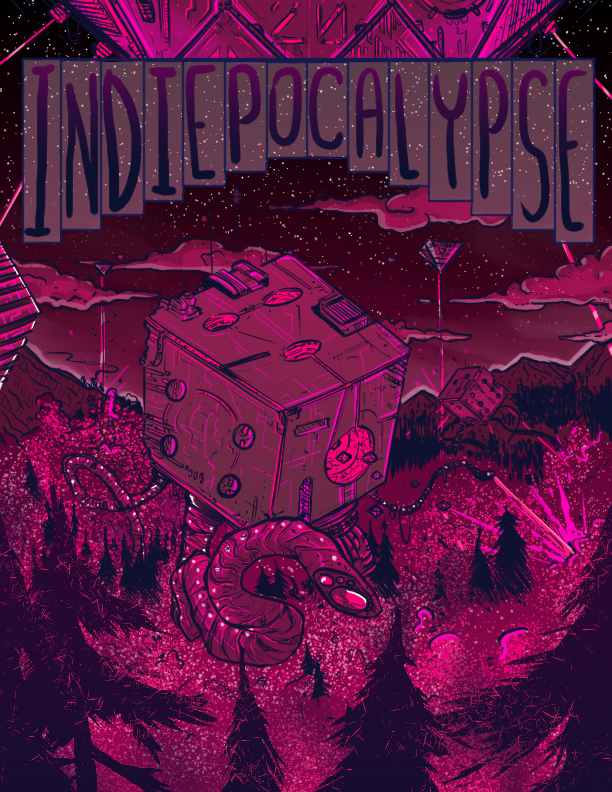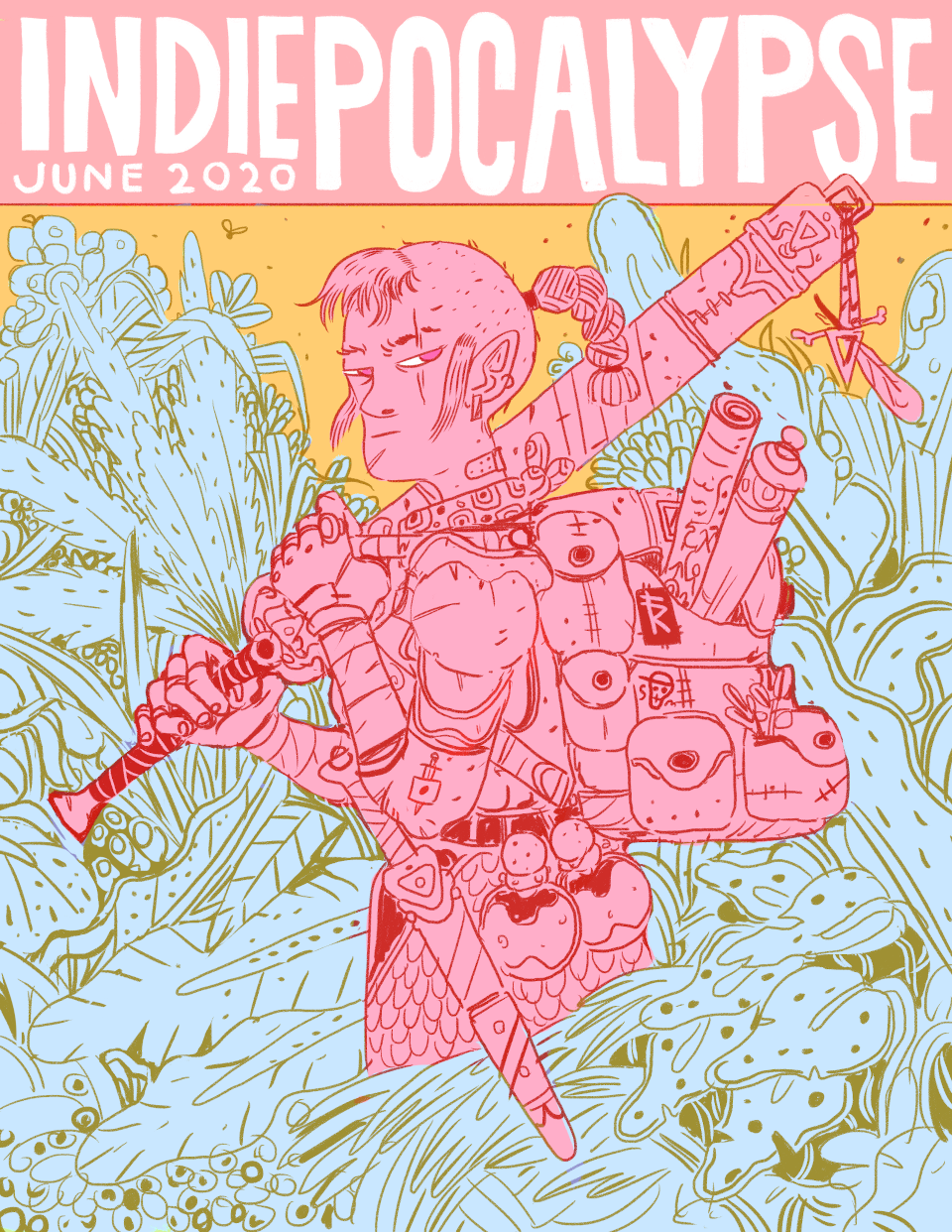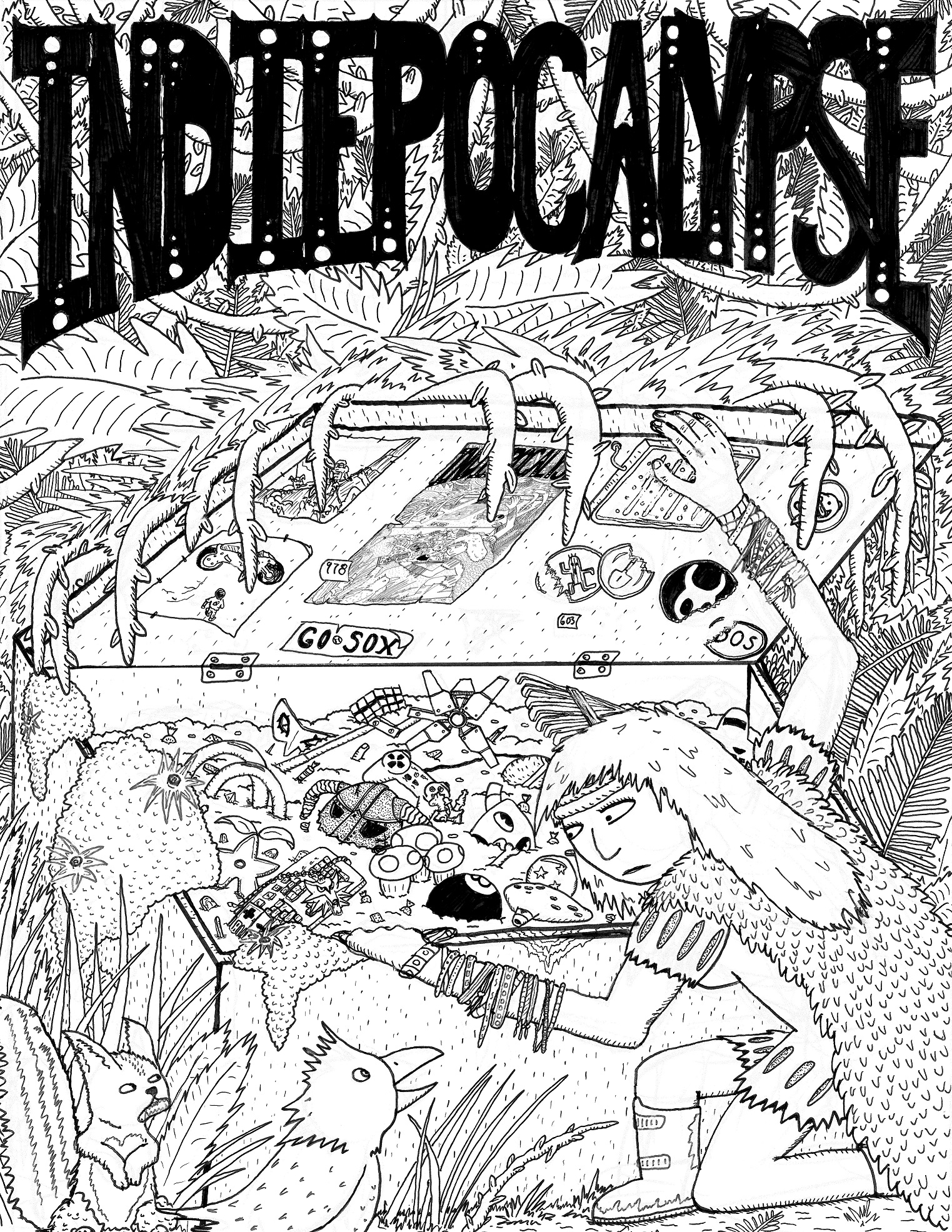
Indiepocalypse is the Anthology/Zine Hybrid of Your Indie Gaming Dreams
These days, creating an indie game is arguably easier than ever before thanks to better access to development tools, but that by no means levels the playing field. While initiatives like Indie Megabooth and Wholesome Games have brought the spotlight to games that were previously written off by the larger gaming community, they can’t cover or include everything. There are many games that don’t fit neatly into wholesome or friendly, or that just don’t work well for Let’s Plays and streams. So what are those devs supposed to do? Enter Indiepocalypse.
Now, you may have heard this term before in the discourse, so let’s clear it up: this isn’t the notion that the indie dev world is hurtling towards some kind of apocalyptic bubble burst. It’s actually quite the opposite. Indiepocalypse is a project created by Andrew, aka Pizza Pranks, that’s a sort of hybrid between a gaming zine and an itch.io bundle. Each month, ten indie games are featured in the zine, along with comic strips and micro-reviews of new and old games. Andrew pays everyone involved, including the devs who submit and the cover artists.

The idea came largely from frustration with how the indie world currently operates. “We’ve had bundles forever but it’s not quite the same thing,” Andrew told me. The model created by Humble is for bundles to be super cheap and to trade mostly on established names, so it’s not really like a sustainable thing, especially if no one knows who you are. I just kind of wanted to provide a place where more developers could fail constantly but there’d always be opportunities to try again.”
There aren’t a ton of paid options for getting your game out there if you’re an indie dev. Events like GDC cost money to attend and also don’t pay speakers. Others, like the IGAF, charge for games to even be judged. As Andrew puts it, “you’re just paying money on money on money but it never flows back to you.”
Indiepocalypse aims to change that. Each issue collects ten different indie games and pays each developer $20 for their contribution. While this isn’t a ton off the bat, Andrew also offers royalties to each dev so they can make money off of the zine sales as well. Royalties start at 5% on the backend, and increase to 8% once Andrew has broken even on the issue’s production costs. This excludes any fees that may factor into the equation, Andrew eats those himself.

“I don’t have a lot of money to give out,” Andrew said. “I’m just a guy who’s mildly comfortable and doesn’t spend a lot of money on things, so I’m like ‘okay I paid off my student loans and my car, I can invest that money I was spending on that on indie games.'”
Originally, the zine was meant to be geared towards in-person events. The first issue was created for PAX East 2020 back in February, and Andrew was aspiring to pass it around at other events as well. “There used to be a bi-monthly punk flea market in Boston and I was like ‘this would be perfect for that, I can bring these paper zines people can flip through and buy games, I can go to events with these paper zines and people can be like ‘I’d like to try these games’ and then there was no physical events anymore and I’m just screaming into the void of the internet, which is a lot harder.”
Surprisingly, it seems a lot of indie devs have been a bit sluggish to jump on an opportunity for paid work, perhaps in part because of the increased visibility issues that come from trying to get a project noticed online. The first issue was centered around Boston game developers in honor of PAX, but Andrew said gathering those devs was a bit of a pain. “It was a chore to get people involved when I was just saying ‘I’m offering you money to be in this thing, you have to do like zero work, all I need is your okay basically’ and just nothing.”
Because of the smaller pool to draw from, this also limits some of the things Indiepocalypse can do as a zine. Since he can’t exactly be choosey with cutting devs who apply, Andrew doesn’t implement themes with Indiepocalypse. It’s just sort of whatever comes through that month along with whatever that month’s cover artist came up with. Still, he plans to continue and hopes to expand his reach with both developers and critics. He lamented that there’s no itch.io equivalent for finding writers, but he is open to reviewers hitting him up for capsule reviews in the zine, which range from 30-50 words usually.
So what kinds of games are Indiepocalypse-worthy? According to Andrew, “I’m looking for things that are probably more interesting than what you’d necessarily consider good… I always wanted to be the weird scrappy indie zine, even if I am the only one there, so I have that in mind.”
“But,” he continued. “I also want to build a cohesive zine each time so I want to have a diverse collection of games each time so people can go ‘oh wow indie games can actually be a lot of things.'”

Aside from general growth in reach and audience, Andrew eventually wants Indiepocalypse to be somewhat reminiscent of the Criterion Collection but for indie games– showcasing that games you’ve never heard of can still be worth something. The notion that film preservation is genre agnostic hit pretty hard for him. “And it can be anything like schlocky 80s science fiction or it could be a slow, extreme three hour slice of life where you watch a woman cut potatoes for like five and a half minutes, and these are all cinema worth preserving.”
“We’re like the weird, outsider art thing. We’re not Twitch-friendly, we’re not major site friendly, we’re not E3 stage friendly. So I just want to release a weird thing that comes out every month as a highlight for indies.” You can catch the latest issue of Indiepocalypse the first Friday of each month over on itch.io.





